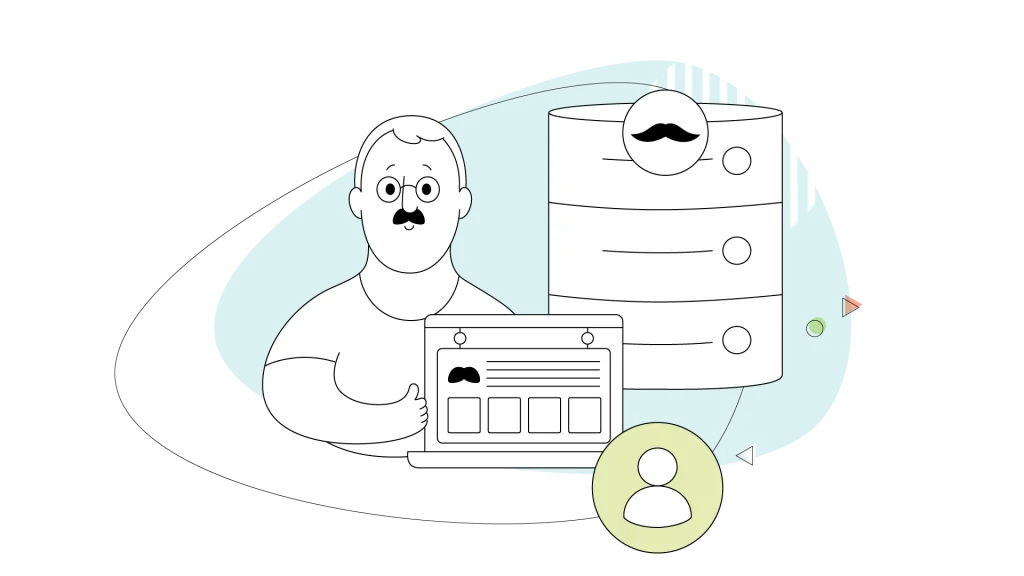Most people, when they think of a web server they immediately picture a vast array of servers working in tandem to power the world’s most popular websites. And they aren’t wrong! The only difference with most web hosting plans is that they employ some clever methods of “cramming” many websites into one server to minimize their carbon footprint and increase power efficiency. Others use dedicated servers and the many benefits they bring to the foreground.
While this method is a legitimate approach for cost-effective website hosting, it also presents the need for optimal performance, especially when hosting mission-critical applications that require high availability.
This is where dedicated servers excel!
Dedicated servers provide many benefits like heightened security, unmetered bandwidth, high performance, and scalability for online businesses and high-traffic websites.
- What Is Dedicated Server Hosting?
- What Are The Benefits of Dedicated Server Hosting?
- How Is Dedicated Server Hosting Different from Other Hosting Types?
- Common Use Cases: Who Needs a Dedicated Server?
- Making the Leap: Is It Time for Dedicated Server Hosting?
- Why Consider HostPapa for Your Dedicated Server Needs?

What Is Dedicated Server Hosting?
Put simply, dedicated hosting means you lease an entire physical server from a hosting provider exclusively for your own use.
Consider it like having your own personal library as opposed to borrowing books from a community library; this dedicated server, with all its exclusive hardware, is entirely yours. Unlike conventional shared hosting plans, where multiple users utilize the same server and its resources, a dedicated server is assigned to one specific customer.
This concept is often described in the industry as offering a “bare metal” type server, indicating you have direct access to the fundamental server hardware.
What Are The Benefits of Dedicated Server Hosting?
This exclusivity is the cornerstone of dedicated server hosting and brings several key characteristics to the forefront:
- Full resource allocation: All the server’s CPU (Central Processing Unit) cores, RAM (Random Access Memory), SSD storage (disk space), and network bandwidth are at your sole disposal. There’s no contention for these physical resources with other users, ensuring consistent and predictable performance.
- Root access/full administrative control: You typically get “root access” (the root account for Linux) or “administrator” (for Windows) access. This means you have complete control over the server’s operating system, software installations, configurations, and security settings. You can tailor the server environment precisely to your application’s needs and install the control panel of your choice. For instance, at HostPapa, we ensure our Dedicated Servers provide full root access, giving you the autonomy to build a truly custom environment from the ground up, whether you prefer cPanel, Plesk, or a command-line interface.
- Elevated security and better system isolation: Because you’re not sharing the server with anyone else, the risk of being affected by another user’s security vulnerabilities or malicious activities is drastically reduced. You can implement your own stringent security protocols, such as dedicated IP addresses.
- Customization: From the choice of operating system to the specific versions of software and control panels, you have the freedom to build a server environment that perfectly matches your requirements.
The trend towards bare metal servers, another term often used interchangeably with dedicated servers, underscores the demand for direct hardware access without the virtualization layers found in many cloud environments. This provides raw, unadulterated power, crucial for performance-sensitive applications.

How Is Dedicated Server Hosting Different from Other Hosting Types?
Ok, now you know quite a bit more about dedicated servers, right? However, knowing the distinctions between hosting types is also vital for making an informed decision.
In simple or shared web hosting, multiple users share the same physical server, which reduces costs but can lead to limitations in performance and resource availability compared to dedicated hosting, where resources are solely allocated to one user.
Choosing the right hosting company is paramount to navigate the potential challenges associated with dedicated server plans. A suitable web host not only alleviates common pain points but also enhances the overall experience of transitioning to a dedicated server, ensuring users can manage their web hosting journey more effectively.
Let’s briefly compare dedicated hosting to its common alternatives like shared hosting, cloud hosting, and VPS hosting:
1. Web Hosting (Often Called Shared Web Hosting)
- What it is: The shared server hosting plan is the most basic and affordable hosting type. Multiple websites (often hundreds, sometimes thousands) reside on a single physical server, sharing all its resources (CPU, RAM, disk space, bandwidth).
- Limitations: Performance can be inconsistent (the “noisy neighbour” effect), security risks are higher due to shared hosting environments, and customization options are minimal. You typically don’t have root access.
- Why outgrow it: As your website traffic grows, or if you need more control and security, shared hosting quickly becomes restrictive. It’s a great starting point, but not a long-term solution for serious online ventures.
2. VPS (Virtual Private Server) Hosting
- What it is: A step up from shared hosting. A physical server is partitioned into multiple virtual servers, each acting as an independent environment. While still sharing the underlying hardware, a VPS provides guaranteed resource allocations and more control (often including root access) than shared hosting.
- Advantages over Shared: Better performance, enhanced security, and more customization capabilities. Monitoring server performance, including speed, load times, and resource usage, allows for adjustments and fine-tuning of server settings to ensure optimal performance.
- Dedicated vs. VPS: While a VPS offers a good balance for many, a dedicated server provides superior raw power, complete resource exclusivity, and the highest level of isolation and control, as you’re not sharing any hardware components at a foundational level. For truly demanding applications or maximum security, dedicated hosting is the way to go. This is why many growing businesses outgrowing their VPS plans look to providers like HostPapa for a seamless upgrade path to a dedicated machine, ensuring they get that uncontended performance when it matters most. Dedicated servers offer total control over all aspects of the server without interference from others, including choosing the operating system, installing applications, and determining admin access.
3. Cloud Hosting
- What it is: Utilizes a network of virtual and physical servers to provide scalable and flexible hosting resources. You typically pay for what you use, and resources can often be scaled up or down quickly.
- Dedicated vs. Cloud: Cloud hosting offers excellent scalability and redundancy. However, some cloud environments might still involve sharing underlying physical hardware at some level (multi-tenant clouds), potentially leading to performance variability or “hypervisor tax” (overhead from the virtualization layer). Cloud instances are designed for seamless compatibility with various cloud services. Dedicated servers (or “bare metal cloud servers,” which blend dedicated hardware with cloud-like provisioning) offer consistent, predictable performance with direct hardware access. Hybrid cloud strategies are also emerging, sometimes combining dedicated servers for core workloads with public cloud resources for scalability or disaster recovery. A cloud instance offers seamless operational capabilities within the broader cloud ecosystem, contrasting the limitations of dedicated hosting solutions.
The choice between these hosting types hinges on your specific needs regarding performance, security, control, scalability, and budget. For those who demand the best in all these categories, dedicated server hosting stands out as the premium choice.

Common Dedicated Hosting Use Cases: Who Needs a Dedicated Server?
While every online venture is unique, there are several common scenarios where opting for a dedicated server becomes not just beneficial, but essential for growth and stability:
- High-traffic websites and blogs: If your website or blog consistently attracts tens of thousands, or even hundreds of thousands, of visitors each month, a dedicated server can ensure a smooth user experience. The exclusive resources prevent slowdowns during traffic surges, keeping your audience engaged and your search engine rankings healthy.
- Large eCommerce stores: Online stores handling a high volume of transactions, managing extensive product databases, and requiring stringent security (like PCI DSS compliance for payment processing) will find a dedicated server indispensable. It provides the robust performance needed for quick checkouts and the isolated environment crucial for protecting customer data.
- Resource-intensive applications: Does your project involve game servers, a complex SaaS (Software as a Service) platform, large databases, big data processing, or video streaming? These applications demand significant processing power, memory, and bandwidth, all of which a dedicated server can reliably provide without contention from other users. Dedicated servers are also ideal for hosting various business applications that require significant resources and reliable performance. In these cases, exclusive access to all the resources like the server’s CPU, RAM, and storage is a necessity for high performance.
- Agencies and developers: If you’re an agency managing multiple client websites or a developer juggling various projects, a dedicated server offers unparalleled control and resource isolation. You can configure environments precisely for each client, ensure one client’s traffic doesn’t impact another, and manage everything under one powerful roof.
- Businesses with strict security and compliance needs: Organizations in sectors like healthcare (requiring HIPAA compliance), finance, or legal services often handle highly sensitive data. A dedicated server provides the necessary data isolation and allows for the implementation of custom, stringent security measures paramount for meeting regulatory requirements and protecting private information.
- Applications requiring specific software or OS configurations: Sometimes, your application might need a particular version of an operating system, a specific software library, or a custom server configuration that simply isn’t available or permissible on shared or standard VPS hosting. A dedicated server gives you the freedom to install and configure exactly what you need.

Making the Leap: Is It Time for Dedicated Server Hosting?
Recognizing the need for an upgrade is the first step.
- Are you consistently hitting resource limits with your current hosting plan?
- Is your website’s performance sluggish, leading to frustrated visitors and potentially impacting your SEO?
- Do you have growing security concerns, or does the lack of custom configuration options hinder your development or operational capabilities?
All the above are strong indicators that it might be time to consider moving to a more robust solution, like a dedicated server.
It’s true that stepping up to dedicated server hosting can involve more considerations regarding server management (unless you opt for managed services, which can alleviate this) and typically represents a higher monthly cost compared to shared or VPS options. For those concerned about the technical workload, our Managed Dedicated Server plans at HostPapa are designed to solve this exact problem, where our expert PapaCare team handles the server setup, security hardening, and ongoing maintenance for you.
However, for a growing online business, the comprehensive dedicated server benefits, such as unparalleled performance, enhanced security, and complete control, often far outweigh these initial considerations. The ability to reliably serve your customers, protect sensitive data, and scale your operations without technical roadblocks is invaluable. Managing software updates on dedicated servers is integral to maintaining security and performance. Additionally, a dedicated hosting service offers flexibility, control, and enhanced security compared to shared hosting.
If these scenarios and dedicated server benefits resonate with your current needs, exploring a robust dedicated server hosting solution is your next logical step. Many providers offer excellent options, and finding the right one can make all the difference.
Why Consider HostPapa for Your Dedicated Server Needs?
At HostPapa, we get it! A dedicated server plays a key role in your online success, and when considering why you should choose one, HostPapa emerges as a compelling choice.
Our dedicated server solutions are designed to provide the power, reliability, and control you need to confidently scale your operations and deliver exceptional experiences to your users.
We believe that accessing your own dedicated server shouldn’t be overly complex or prohibitively expensive. That’s why HostPapa, as a dedicated server provider, focuses on delivering tangible value:
- High-performance hardware and infrastructure: We utilize enterprise-grade server hardware to ensure your applications and websites benefit from rapid processing speeds and consistent uptime. This directly translates to the enhanced performance and reliability discussed earlier, ensuring your critical services are always available and responsive.
- Flexible management options and expert support: Whether you’re a seasoned IT pro looking for full root access and an unmanaged dedicated server, or you prefer the peace of mind that comes with our managed services, where we handle the technical heavy lifting, HostPapa provides options. Our 24/7 expert support team is always on hand to assist, ensuring you get the most out of your dedicated server environment. This choice allows you to balance complete control with operational ease. Our expert PapaCare support team is available around the clock to provide support for clients with emergency issues and for the entire server management.
- Robust security features: Every HostPapa dedicated server comes with robust security measures in all user accounts, including your own unique IP address, which enhances your online reputation and security posture. We provide the secure foundation you need, allowing you to further customize your defences to meet the specific compliance and data protection needs essential for your online business.
Conclusion
To sum up, dedicated servers provide numerous benefits of a physical computer, such as upgraded security, consistent high performance, and significant scalability, making them an ideal hosting solution for ambitious online entrepreneurs and high-demand web applications.
The ability to exercise complete control over server configurations and settings means users can truly customize their dedicated server to meet precise business needs. Furthermore, dedicated servers support a wide array of operating systems and offer highly flexible configurations, making them a versatile choice distinct from solutions that rely on virtual machines for resource sharing or other software applications.
Unmanaged dedicated servers require the user to handle all aspects of server management after initial setup by the cloud provider, whereas fully managed options provide comprehensive support. Dedicated servers are also ideal for applications requiring significant computational power, such as machine learning, big data analysis, and content streaming.
Ready to experience the power and control of a HostPapa dedicated server? Explore our dedicated server plans today for a highly customizable solution. Alternatively, contact our expert team for a personalized consultation.
We’re here to help you find the perfect hosting solution to elevate your online presence!
FREQUENTLY ASKED QUESTIONS
What’s the main difference between a dedicated server and a VPS?
A dedicated server grants you exclusive access to an entire physical server and all its server’s resources (CPU, RAM, storage). A VPS (Virtual Private Server) also provides a private environment but is a partitioned segment of a physical server, meaning underlying hardware resources are still shared among multiple VPS instances, even with infrastructure virtualization. A dedicated server offers truly uncontended high performance and resource guarantees and ameliorates slow load times, among other things. Plus, dedicated servers come in different configurations to meet diverse user needs.
Knowing that bandwidth capacity is an indispensable part is paramount when selecting a hosting provider to ensure optimal performance. Dedicated servers provide enhanced computing power, making them ideal for high-traffic websites and demanding applications. The role of the data center is vital in supporting dedicated servers, ensuring performance and reliability.
Is a dedicated server difficult to manage?
The level of server management required for a dedicated server depends on your choice. Unmanaged dedicated servers offer complete control but require technical knowledge for setup, tackling security issues, operating system updates, security patches, and server monitoring. It means that server administration is in your hands.
However, many providers, including HostPapa, offer both unmanaged and fully managed hosting services where these tasks are handled for you. With our managed option, our PapaCare support team takes on the heavy lifting of server administration, making dedicated server hosting accessible even without extensive IT expertise.
Do I get a unique IP address with a dedicated server?
Typically, yes, but you need to check with your hosting provider. HostPapa provides its users with a unique IP address, essential for businesses that require privacy, wish to avoid blacklisting, or use specific applications like email servers.
Is a dedicated server significantly more expensive?
While the monthly cost of a dedicated server is generally higher than shared hosting or VPS plans, it reflects the value of exclusive resources, superior high performance, enhanced security, and complete control. For businesses where uptime, speed, and security are critical, the investment in a dedicated server often provides a strong return by preventing costly downtime and enabling growth. Many hosting providers offer a range of dedicated server plans to suit different budgets. Email accounts are also an important aspect of web hosting services, allowing users to create and manage them through cPanel.




